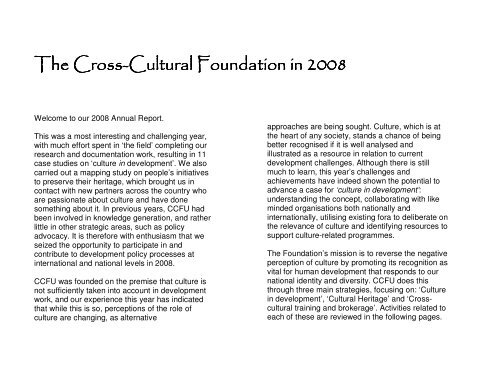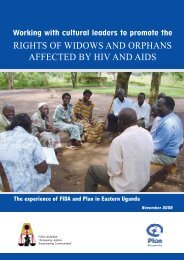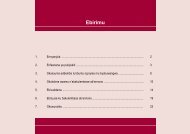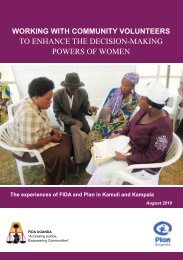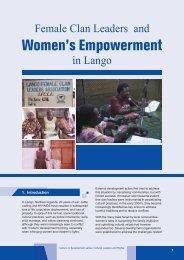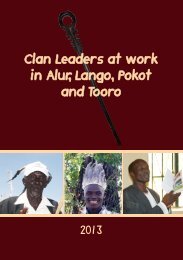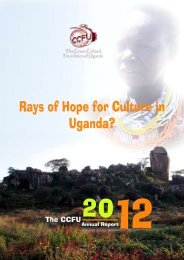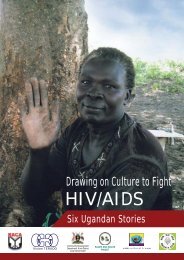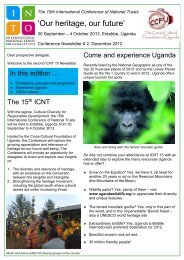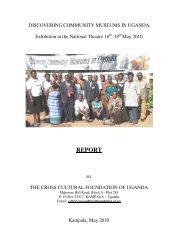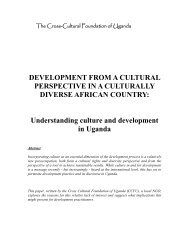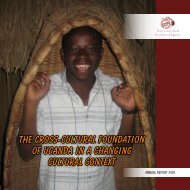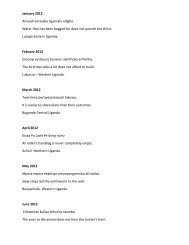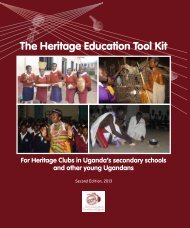Annual Report - Cross-Cultural Foundation of Uganda(CCFU)
Annual Report - Cross-Cultural Foundation of Uganda(CCFU)
Annual Report - Cross-Cultural Foundation of Uganda(CCFU)
You also want an ePaper? Increase the reach of your titles
YUMPU automatically turns print PDFs into web optimized ePapers that Google loves.
Welcome to our 2008 <strong>Annual</strong> <strong>Report</strong>.<br />
This was a most interesting and challenging year,<br />
with much effort spent in ‘the field’ completing our<br />
research and documentation work, resulting in 11<br />
case studies on ‘culture in development’. We also<br />
carried out a mapping study on people’s initiatives<br />
to preserve their heritage, which brought us in<br />
contact with new partners across the country who<br />
are passionate about culture and have done<br />
something about it. In previous years, <strong>CCFU</strong> had<br />
been involved in knowledge generation, and rather<br />
little in other strategic areas, such as policy<br />
advocacy. It is therefore with enthusiasm that we<br />
seized the opportunity to participate in and<br />
contribute to development policy processes at<br />
international and national levels in 2008.<br />
<strong>CCFU</strong> was founded on the premise that culture is<br />
not sufficiently taken into account in development<br />
work, and our experience this year has indicated<br />
that while this is so, perceptions <strong>of</strong> the role <strong>of</strong><br />
culture are changing, as alternative<br />
approaches are being sought. Culture, which is at<br />
the heart <strong>of</strong> any society, stands a chance <strong>of</strong> being<br />
better recognised if it is well analysed and<br />
illustrated as a resource in relation to current<br />
development challenges. Although there is still<br />
much to learn, this year’s challenges and<br />
achievements have indeed shown the potential to<br />
advance a case for ‘culture in development’:<br />
understanding the concept, collaborating with like<br />
minded organisations both nationally and<br />
internationally, utilising existing fora to deliberate on<br />
the relevance <strong>of</strong> culture and identifying resources to<br />
support culture-related programmes.<br />
The <strong>Foundation</strong>’s mission is to reverse the negative<br />
perception <strong>of</strong> culture by promoting its recognition as<br />
vital for human development that responds to our<br />
national identity and diversity. <strong>CCFU</strong> does this<br />
through three main strategies, focusing on: ‘Culture<br />
in development’, ‘<strong>Cultural</strong> Heritage’ and ‘<strong>Cross</strong>cultural<br />
training and brokerage’. Activities related to<br />
each <strong>of</strong> these are reviewed in the following pages.
Page<br />
<br />
1. CULTURE IN DEVELOPMENT 3<br />
Research and documentation<br />
Policy advocacy and influencing perceptions<br />
Networking and collaboration<br />
2. CULTURAL HERITAGE PROGRAMME 11<br />
Support to people’s museums<br />
3 CROSS-CULTURAL TRAINING AND BROKERAGE 13<br />
Endogenous Development Gender write-shop<br />
<strong>Cross</strong>-cultural training<br />
Capacity building in the documentation process<br />
4 PROSPECTS FOR 2009 15<br />
5 THANK YOU TO ALL OUR SUPPORTERS 16
Research and documentation<br />
<br />
<br />
At its inception, <strong>CCFU</strong> found little literature<br />
viewing culture in a positive light, as a resource to<br />
be used to contribute to sustainable and equitable<br />
development that reflects our local context.<br />
In 2008, we therefore continued and completed<br />
the documentation <strong>of</strong> 11 case studies that<br />
demonstrate how cultural resources (such as<br />
values, systems, role models, resource persons,<br />
and ancestral knowledge) have been used by<br />
development practitioners to address<br />
development challenges. These challenges relate<br />
to gender, HIV/AIDS (information dissemination,<br />
counselling, nutrition, and influencing cultural<br />
practices), orphans’ and widows’ rights, and<br />
culture as a business. In June, two publications<br />
on ‘Culture in Development in <strong>Uganda</strong>:<br />
experiences and prospects’ and ‘Drawing on<br />
Culture to fight HIV/AIDS’ accompanied by DVDs,<br />
were launched at a national event.<br />
The <strong>Foundation</strong> also completed research and<br />
documentation <strong>of</strong> two cases that illustrate how<br />
working with clan leaders can enhance the<br />
protection <strong>of</strong> widows’ and orphans’ rights. One<br />
looked at a FIDA/PLAN project in Kamuli district;<br />
the other explored the role <strong>of</strong> female clan leaders’<br />
(which in our local context is a rare occurrence) in<br />
promoting girl child education and protecting the<br />
rights <strong>of</strong> women in Lira.<br />
Some <strong>of</strong> our other research and documentation<br />
work included an investigation <strong>of</strong> ‘Culture and<br />
social protection for the very poor in <strong>Uganda</strong>’ in<br />
the three regions <strong>of</strong> Buganda, Ankole and Lango.<br />
The findings were shared at an international<br />
conference on Social Protection for the Poorest in<br />
Africa organised by Development Training and<br />
Research and the Chronic Poverty Research<br />
Centre in September. All these case studies are<br />
available at www.crossculturalfoundation.or.ug
Documentation: Reflections<br />
Our case studies, where cultural resources<br />
such as knowledge and values, have been<br />
used to address present day development<br />
challenges, show that culture, though subtle<br />
and <strong>of</strong>ten not recognised, remains a strong<br />
aspect <strong>of</strong> society in <strong>Uganda</strong>. We however need<br />
to deepen our understanding <strong>of</strong> the local<br />
context where the root causes <strong>of</strong> these<br />
challenges– and probably their solutions – are<br />
located. This requires shifting our focus from a<br />
sorry state <strong>of</strong> permanent “poverty, ignorance<br />
and disease” to exploring inherent cultural<br />
sources which motivate and empower<br />
communities as key actors, rather than as mere<br />
recipients <strong>of</strong> development. It also requires a<br />
shift in perception from culture as something <strong>of</strong><br />
figurative value (using culture as a development<br />
tool) to a deeper understanding in terms <strong>of</strong><br />
values, systems, motivation, and synergy<br />
between local and wider worldviews.<br />
Knowledge generated on ‘culture in<br />
development’ needs to reach wider audiences<br />
– supporters and promoters <strong>of</strong> culture, as well<br />
as those outside this category, working on<br />
issues <strong>of</strong> governance, human rights, and<br />
economic development. This will foster<br />
sharing <strong>of</strong> experiences, collective analysis,<br />
and the incorporation <strong>of</strong> culture in<br />
development initiatives.<br />
<br />
<br />
Policy advocacy and influencing<br />
perceptions<br />
<br />
“Influencing the negative perceptions <strong>of</strong> culture is<br />
one <strong>of</strong> the main challenges <strong>CCFU</strong> will face” we<br />
have repeatedly been told by practitioners<br />
engaged in programmes to promote culture. Such<br />
negative perceptions are however slowly<br />
changing, with renewed interest at national level<br />
in relation to education and health, and at
international level in relation to issues <strong>of</strong><br />
creativity, diversity and sustainability.<br />
A tendency to measure the value <strong>of</strong> culture in<br />
monetary terms and in terms <strong>of</strong> its contribution to<br />
national revenue is however also gaining ground.<br />
Culture is then given the lowest priority in terms <strong>of</strong><br />
political will and resource allocation, and the legal<br />
framework does not adequately support the<br />
optimal utilisation <strong>of</strong> cultural resources. With<br />
limited internal means to finance the culture<br />
sector, it would be expected that other<br />
opportunities, such as through the ratification <strong>of</strong><br />
international conventions that can provide funding<br />
and other support (for instance the UNESCO<br />
Conventions on the Promotion and Protection <strong>of</strong><br />
<strong>Cultural</strong> Diversity <strong>of</strong> <strong>Cultural</strong> Expressions, and on<br />
Safeguarding the Intangible Heritage) would be<br />
seized, but this has not been the case.<br />
<strong>CCFU</strong>’s efforts in policy advocacy range from<br />
disseminating our case study work, engaging in<br />
dialogue with development actors within and<br />
outside the culture sector, and promoting the<br />
formulation, updating, ratification and<br />
implementation <strong>of</strong> relevant policies in relation to<br />
culture. In 2008, these efforts focused on:<br />
Contribution to the National Development<br />
Plan: The Government <strong>of</strong> <strong>Uganda</strong> invited civil<br />
society to contribute to the development <strong>of</strong> the<br />
2008-2012 National Development Plan (to<br />
replace the Poverty Eradication Action Plan).<br />
<strong>CCFU</strong> joined the Social and <strong>Cultural</strong><br />
Development sector Working Group and took the<br />
lead on the ‘Culture and Development’ subtheme.<br />
A series <strong>of</strong> activities, including a civil<br />
society consultative meeting which attracted 56<br />
participants. A paper highlighting the status,<br />
challenges, opportunities, and strategies to<br />
address issues <strong>of</strong> concern was produced by the<br />
participants and shared with the Ministry <strong>of</strong><br />
Gender, Labour and Social Development as civil<br />
society’s contribution to the National Plan. Five
priority proposals included ‘mainstreaming’ and<br />
resourcing culture in all development initiatives,<br />
cultural heritage education, knowledge generation<br />
and management, cultural infrastructure<br />
promotion, and updating the legal and policy<br />
framework.<br />
UNESCO Conventions: In March, <strong>CCFU</strong><br />
participated in a workshop on the ratification <strong>of</strong><br />
the UNESCO Convention on Safeguarding<br />
Intangible <strong>Cultural</strong> Heritage, which highlighted the<br />
importance <strong>of</strong> intangible heritage and outlined<br />
strategies to support the ratification process and<br />
its benefits. In December, <strong>CCFU</strong> organised a<br />
Support Group Meeting during which civil society<br />
reviewed the commitments made at the<br />
Commonwealth People’s Forum 2007, including<br />
lobbying for the ratification <strong>of</strong> the UNESCO<br />
Convention on Protection and Promotion <strong>of</strong><br />
<strong>Cultural</strong> Diversity <strong>of</strong> <strong>Cultural</strong> Expression. A press<br />
release (published in the New Vision) urging the<br />
Government <strong>of</strong> <strong>Uganda</strong> to speed up the<br />
ratification <strong>of</strong> this Convention was one <strong>of</strong> the<br />
outcomes <strong>of</strong> this event.<br />
Pluralism Knowledge Programme:<br />
Democracy and human rights introduce a<br />
dimension <strong>of</strong> pluralism in development that is not<br />
<strong>of</strong>ten dealt with and is sometimes perceived as<br />
foreign to the local culture. After participating in<br />
an International Summer School on Human<br />
Development and Human Rights organised by<br />
HIVOS and the Kosmopolis Institute in Bangalore,<br />
India, the <strong>Foundation</strong> was requested to<br />
coordinate a “Pluralism Knowledge Programme”<br />
in <strong>Uganda</strong>. This aims at supporting civil society’s<br />
efforts to address issues <strong>of</strong> pluralism in the<br />
country and initial activities in 2008 involved<br />
commissioning four mapping studies, forming a<br />
Temporary Working Group, and participating in a<br />
Regional Conference in Indonesia.
Policy: Reflections<br />
<br />
<br />
There is marked inertia when it comes to issues<br />
related to culture, which is perceived as related<br />
to a traditional past that does not warrant urgent<br />
attention or resource allocation, unless this<br />
attention is drawn by foreign prompting, as was<br />
the case during CHOGM 2007. Participating in<br />
developing civil society’s contribution to the<br />
National Development Plan therefore provided<br />
an opportunity to raise real concerns and<br />
suggest ways in which these could be<br />
addressed by government and other<br />
stakeholders. With cultural affairs only<br />
commanding 0.03% <strong>of</strong> national public spending,<br />
however, this is only the beginning <strong>of</strong> a long<br />
lobbying process.<br />
Once ratified, instruments such as the<br />
UNESCO Conventions and the National<br />
<strong>Cultural</strong> Policy need to be ‘domesticated’ and<br />
popularised into real opportunities for local<br />
organisations and communities. Relevant plans<br />
and adequate resources need to be allocated to<br />
ensure that their objectives are achieved,<br />
beyond mere symbols <strong>of</strong> good intent.<br />
In <strong>Uganda</strong>, much emphasis has been<br />
placed on political pluralism partly<br />
because this is visible in relation to power<br />
and distribution <strong>of</strong> resources. Other forms<br />
<strong>of</strong> pluralism which impact on politics and<br />
development, such as ethnicity, religion,<br />
gender, and regionalism, are <strong>of</strong>ten not<br />
given equal attention. Understanding<br />
these and other forms <strong>of</strong> pluralism<br />
presents opportunities for learning,<br />
fostering respect, harmony and equal<br />
opportunity in a country as diverse as<br />
<strong>Uganda</strong>.<br />
Within civil society itself, tolerance and<br />
pluralism are issues that may be need to<br />
be defined in the struggle to form a<br />
cohesive critical mass that can effectively<br />
play a role in addressing the issues that<br />
affect the vulnerable in whose name we<br />
exist.
Networking and collaboration<br />
Working with others remains vital to discharging<br />
our mission. In2008, we especially appreciated<br />
working with:<br />
The Ethnic Minority Group Forum - <strong>CCFU</strong><br />
participated in this Forum, that promotes the<br />
cultural rights <strong>of</strong> ethnic minorities, and contributed<br />
to a submission to the Equal Opportunities<br />
Committee <strong>of</strong> Parliament.<br />
COMPAS Africa - In June, <strong>CCFU</strong> participated<br />
in a learning event organised by COMPAS<br />
(Comparing and Sharing experiences in<br />
Endogenous Development) Africa held<br />
inBolgatanga, Ghana.<br />
This presented an opportunity to share reports and<br />
proposed plans and their relevance to the<br />
Millennium Development Goals, to seek synergy<br />
between the approaches employed by the<br />
participating organisations, as well as to learn<br />
about participatory video documentation.<br />
Staff exchange programme: <strong>CCFU</strong> hosted<br />
Claire Boonzaaijer for 8 weeks as part <strong>of</strong> an<br />
exchange programme with COMPAS International,<br />
during which she carried out a desk research on<br />
culture, human rights and governance in <strong>Uganda</strong><br />
and the status <strong>of</strong> the UNESCO Convention on the<br />
promotion <strong>of</strong> cultural diversity. She co-facilitated a<br />
COMPAS gender write-shop as part <strong>of</strong> her<br />
learning objectives and made monitoring visits to<br />
COMPAS partners in <strong>Uganda</strong> and Tanzania.
International National Trust Organisation<br />
(INTO) - <strong>CCFU</strong> became a member <strong>of</strong> INTO, which<br />
presents opportunities for learning, information<br />
and resource sharing between countries across<br />
the globe, for heritage conservation, development,<br />
management, and education.<br />
<strong>CCFU</strong> Support group – In 2008, the <strong>CCFU</strong><br />
Support Group (with more than 100 voluntary<br />
members) was invited to all the <strong>Foundation</strong>’s<br />
public events and received copies <strong>of</strong> our<br />
documentation outputs. At a meeting held in<br />
December, members indicated that the Support<br />
Group meetings presented a useful space for<br />
learning and sharing experiences, and proposed<br />
that in future this forum be used to develeop<br />
advocay strategies and produce concrete outputs<br />
for advancing the ‘culture in development’ agenda<br />
in <strong>Uganda</strong>.<br />
Networking: Reflections<br />
<br />
<br />
Through networking, <strong>CCFU</strong> has developed<br />
several beneficial partnerships that have<br />
allowed us to broaden our understanding <strong>of</strong> the<br />
development context within which culture is<br />
located. We have been exposed to the efforts <strong>of</strong><br />
like-minded individuals and organisations, and<br />
held discussions with them that have challenged<br />
our thinking on ‘culture in development’.<br />
There is a need to maintain the momentum to<br />
lobby for a conducive policy framework by<br />
engaging development partners within and<br />
outside the <strong>CCFU</strong> Support Group, by involving<br />
development actors whose work does not<br />
explicitly include the promotion <strong>of</strong> culture, and<br />
by collaborating with international organisations<br />
to share experiences and critically reflect on the<br />
relevance <strong>of</strong> our efforts in the regional and<br />
global contexts.
The <strong>Foundation</strong> launched a <strong>Cultural</strong> Heritage<br />
Programme in 2007, with two main initiatives. One<br />
<strong>of</strong> these is entitled Linking past and future:<br />
People’s museums and cultural resource centres<br />
in <strong>Uganda</strong>.<br />
Support to People’s Museums<br />
Rather than focusing on Government museums<br />
(that are <strong>of</strong>ten divorced from ordinary people), this<br />
focuses on people’s museums or cultural resource<br />
centres - whose existence is less well known.<br />
Emphasis is placed on attempts by local<br />
organisations or individuals to make a connection<br />
with the past. In the course <strong>of</strong> the last two years, it<br />
had come to <strong>CCFU</strong>’s attention that, in some parts<br />
<strong>of</strong> the country, a few individuals and communities<br />
had taken initial steps to protect and revive their<br />
culture through such means.<br />
In collaboration with the <strong>Uganda</strong> National Museum<br />
and with support from UNESCO, <strong>CCFU</strong> undertook<br />
a mapping study to identify such initiatives. <strong>CCFU</strong><br />
covered all four regions <strong>of</strong> <strong>Uganda</strong>, taking the lead<br />
on which sites to visit from Community<br />
Development Officers, resource persons, and the<br />
initiators <strong>of</strong> community ‘museums’. 50 sites were<br />
visited in 19 districts.<br />
A written and photographic record <strong>of</strong> 24 sites was<br />
taken, where an initiative had potential to sustain<br />
itself with limited support. Out <strong>of</strong> these, 13<br />
initiatives were considered vibrant, having been<br />
established primarily to showcase culture with a<br />
link to development, having a collection <strong>of</strong> items <strong>of</strong><br />
cultural or historical value and showing a<br />
willingness to exhibit artefacts to the public. A plan<br />
to support these initiatives was developed and will<br />
be implemented in 2009.
People’s museums: Reflections<br />
The existence <strong>of</strong> private initiatives to preserve<br />
culture, most without external funding or<br />
linkages to tourism, indicate that culture is an<br />
important social dimension that is kept alive by<br />
people’s desire to restore and preserve what<br />
they consider essential aspects <strong>of</strong> their identity.<br />
This has in places occurred despite war,<br />
displacement and pressing survival needs,<br />
even where there has been a breakdown in the<br />
preservation <strong>of</strong> cultural values.<br />
To sustain such initiatives, the significance <strong>of</strong><br />
one’s cultural heritage needs to be locally<br />
understood. The relevance <strong>of</strong> a community<br />
museum therefore lies in its ability to depict and<br />
retell history, supported by artefacts and items<br />
that are significant to a community’s identity.<br />
Community museums present an opportunity to<br />
keep a collective memory alive for generations<br />
to come and form the basis upon which new<br />
history can be made.
Endogenous Development Gender<br />
write-shop<br />
In November, a gender write-shop was organised<br />
for partners <strong>of</strong> two Dutch-based programmes<br />
COMPAS (Comparing and Sharing experiences in<br />
Endogenous Development) and PROLINNOVA<br />
(Promotion <strong>of</strong> Local Innovations). <strong>CCFU</strong> hosted<br />
and facilitated this event, which brought together<br />
16 participants from <strong>Uganda</strong>, Tanzania, Lesotho,<br />
South Africa, Ghana, Nepal, Ethiopia, Niger and<br />
the Netherlands. The event provided an<br />
opportunity to share experiences, and to deepen<br />
an understanding <strong>of</strong> gender from an endogenous<br />
development perspective.<br />
<strong>Cross</strong>-cultural training<br />
<strong>CCFU</strong> helped the partners <strong>of</strong> CARE-<strong>Uganda</strong> in<br />
Pader district to carry out a cultural baseline. It<br />
! <br />
<br />
also undertook a sensitisation session for Oxfam<br />
Kampala staff on culture in development. While<br />
this provided an opportunity for these<br />
organisations to reflect on how to incorporate<br />
culture in their work, these remained one-<strong>of</strong>f<br />
exploratory engagements.<br />
Capacity building in the<br />
documentation process<br />
<strong>CCFU</strong> opted to include a capacity building aspect<br />
to documenting case studies. With enhanced<br />
research and documentation skills, it was<br />
envisaged that local organisations and groups<br />
would in future be better able to document their<br />
experiences and best practices. With varying<br />
extents <strong>of</strong> competences found in these<br />
organisations, this however proved very<br />
demanding in terms <strong>of</strong> time and other resources.
Training: Reflections<br />
Adopting a cultural approach requires a shift<br />
in perception: from culture as a threat to<br />
development, to a solution. This is not a new<br />
and fashionable approach, but a challenging<br />
one that requires reflection on our notion <strong>of</strong><br />
development, taking into account the local<br />
context and questioning our biases.<br />
An entirely newly constructed cultural<br />
approach requires testing, patience,<br />
confidence and funding, which may not be<br />
readily available to development actors who<br />
have become accustomed to the security <strong>of</strong><br />
log-frames and assured donor support against<br />
known and tested Western approaches.<br />
These challenges may lead us to a<br />
reductionist / instrumentalist approach to<br />
culture in development where emphasis is<br />
placed on, say, working with traditional<br />
institutions, without going beyond to explore<br />
cultural values, principles and practices. It<br />
could also mean a marginal incorporation <strong>of</strong><br />
culture into development approaches, with a<br />
limited outcome, later to be easily dismissed<br />
as romanticism.
" # $<br />
<br />
What does 2009 have in store for <strong>CCFU</strong>?<br />
A number <strong>of</strong> initiatives are bearing fruit: we<br />
anticipate, in the coming year, to firmly establish<br />
our budding <strong>Cultural</strong> Heritage programme, with<br />
practical support to selected people’s museums;<br />
we also plan to develop, pilot and document an<br />
exciting training approach to ‘culture in<br />
development’; our research work will also deepen<br />
with cases focusing on governance issues.<br />
How do all these add up to change? This will be a<br />
major challenge for the coming year: ensuring that<br />
our growing activities benefit from synergy and link<br />
up with trends and initiatives elsewhere in <strong>Uganda</strong><br />
and beyond…<br />
Culture in development<br />
In 2009, <strong>CCFU</strong> will carry on with its research and<br />
documentation work. Two cases studies on the<br />
interface between governance, human rights and<br />
culture will be produced. <strong>CCFU</strong> will also complete<br />
the production <strong>of</strong> a further case study on gender,<br />
culture and the reconciliation <strong>of</strong> traditional and<br />
modern values (the Ekisaakaate, a holiday<br />
programme for youth run by the Buganda<br />
Kingdom).<br />
Influencing<br />
As an outcome <strong>of</strong> our involvement in the 2007<br />
Commonwealth People’s Forum and in<br />
subsequent activities to take forward some <strong>of</strong> its<br />
recommendations, the <strong>Foundation</strong> plans to<br />
produce a publication on ‘Beyond the 2007CPF:<br />
what next?’, which targets civil society and other<br />
development partners. This highlights the<br />
outcomes <strong>of</strong> the People’s Forum workshop on<br />
‘Culture in Development: A must for equitable and<br />
sustainable development’, reflections by the
Commonwealth <strong>Foundation</strong> and a proposed way<br />
forward.<br />
Under the Pluralism Knowledge Programme, a<br />
regional conference will be organised to discuss<br />
salient issues emerging from the four mapping<br />
studies, which together with issues emerging from<br />
deliberations at the conference, will inform the<br />
focus <strong>of</strong> the Pluralism Knowledge programme in<br />
<strong>Uganda</strong> for the coming years.<br />
In 2009, <strong>CCFU</strong> plans to coordinate and support<br />
efforts towards updating existing national laws<br />
related to culture, and to continue advocating for<br />
the ratification <strong>of</strong> the 2005 UNESCO Convention.<br />
This will entail widening our partner networks at<br />
national and international levels, and increasing<br />
our internal human resource capacity.<br />
<strong>Cultural</strong> Heritage<br />
The <strong>Foundation</strong> has developed a concept to<br />
support 13 People’s Museums. With funding from<br />
UNESCO, these initiators will be supported to<br />
improve their museums through training,<br />
cataloguing <strong>of</strong> artefacts, peer learning through<br />
exchange visits, and seed grants to improve on<br />
the viability <strong>of</strong> their initiatives.<br />
<strong>Cross</strong>-cultural training and brokerage<br />
Based on its research, the <strong>Foundation</strong> will develop<br />
a training curriculum on ‘culture in development’<br />
and use this to run the first module <strong>of</strong> a stand<br />
alone course on this subject (the second training<br />
module to be held in 2010).
% ! & <br />
<br />
We take this opportunity to thank all those who<br />
made our work possible in 2008.<br />
Our Board <strong>of</strong> Trustees has encouraged us<br />
throughout the year, and guided us on different<br />
aspects <strong>of</strong> our work. Special thanks go to Patrick<br />
Kiirya (in-coming Chairperson), Deborah Kaijuka<br />
(out-going Chairperson), our Treasurer Augustine<br />
Okurut and members James Baba, Juliana<br />
Kuruhiira and Dipak Naker.<br />
During the year, <strong>CCFU</strong> received financial support<br />
<strong>of</strong> UGS.199,000,000 from friends listed below,<br />
without whom we would not have been able to<br />
meet our objectives and planned activities. We<br />
therefore acknowledge with thanks the<br />
contributions <strong>of</strong>:<br />
Commonwealth <strong>Foundation</strong><br />
COMPAS<br />
EU civil society capacity building programme<br />
DanChurchAid<br />
Development Research and Training / Chronic<br />
Poverty Research Centre<br />
HIVOS micro-fund programme<br />
HIVOS and Kosmopolis Institute knowledge<br />
programme<br />
OXFAM<br />
Plan International in <strong>Uganda</strong><br />
UNESCO Nairobi <strong>of</strong>fice<br />
World Health Organisation<br />
A copy <strong>of</strong> the full audit report and financial<br />
statement is available upon request.


